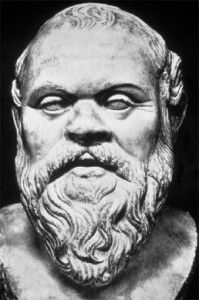Socrates

And Taleb
"Socrates required of astronomy, if it was to be true science, that it should show why it was best that the sun and moon should be as they are." Santayana (emphasis in original).
I suspect Nassim Taleb would have fun with that passage. Not with Santayana (whom, I suspect, he respects), but with Socrates. I've always liked Socrates. Most people do. It's hard not to like the guy, but he's had a number of detractors: Willmoore Kendall, Nietzsche, Popper.
And Taleb. During my godson's Confirmation Mass on a chilly Friday evening in Alpena, Michigan (Nock's boyhood home for a few years, incidentally), I read a handful of pages in Taleb's Antifragile. Okay, I shouldn't have been reading during the Mass, but it was a long one and it wasn't an obligatory Mass and it was only during the first part of the Mass (not the actual lMass part), so there you have it.
Anyway, it was some of the best content I'd read in years. At some point, I will re-read it and, hopefully, distill it better in my mind and, perhaps, distill it for TDE readers, but when it comes to Taleb's message about Socrates, the point stuck with me: Socrates was a pain because he refused to accept that certain things cannot be adequately articulated. If people claimed to know something that they couldn't articulate, Socrates beat them down (kindly, I suppose, but he still beat them down). That, Taleb argues, is absurd. The world--society, business, individuals--run on uncertainty and probabilities. We can't articulate rationale for everything we do and think, but that doesn't mean our thoughts and actions are void of meaning.
Taleb's point was well-taken. I still hold Plato in higher esteem that Taleb's Popper, but Taleb succeeded in knocking Plato-Socrates down a few notches in my estimation.
